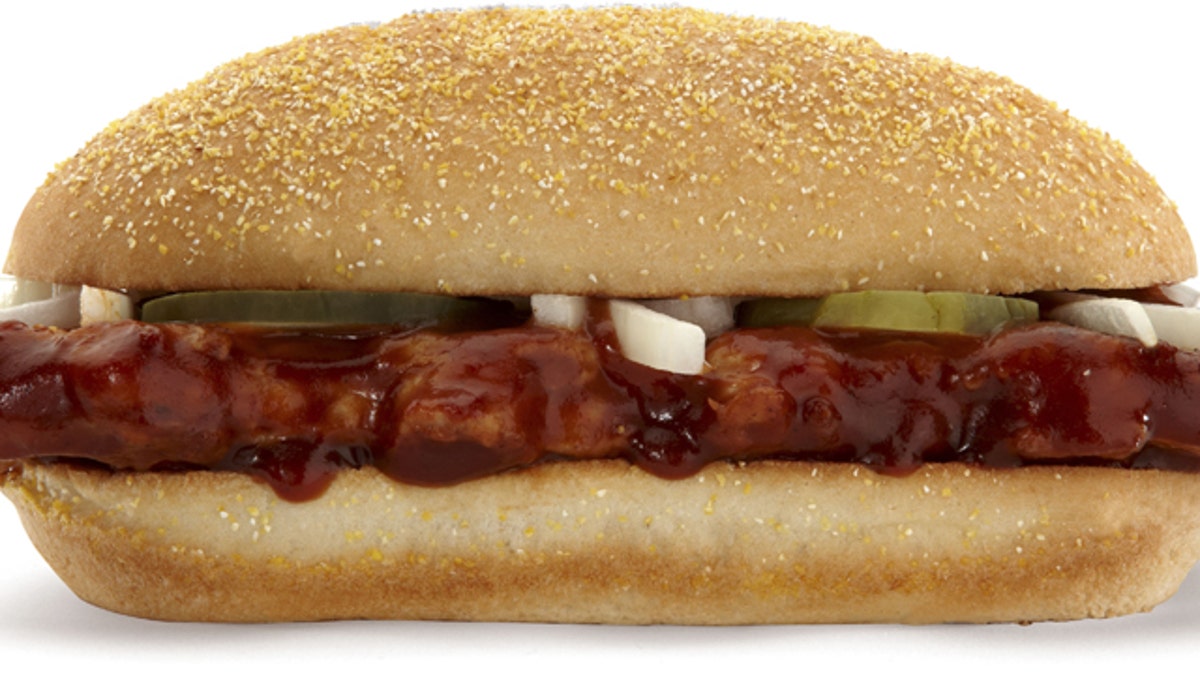
Bradley Chong had a McRib for lunch on Nov. 13. He had another the next day, and the next day, and the next. In fact, he claims to have eaten a McRib practically every day since McDonald's brought back their sauce-laden, processed pork patty earlier this month.
Chong knows his access to the McRib won't last forever. On Dec. 5, it will disappear from the McDonald's near his home in Honolulu and from every McDonald's in America. When will it return? No telling.
Is a McRib shortage to blame? No. McDonald's sells the sandwich year-round in Germany. But despite fans clamoring for it in the United States, McDonald's spokeswoman Ashlee Yingling explains that "it's always been a promotional menu item" available for just a few weeks at a time.
Welcome to Artificial Scarcity, Consumer Edition. The tactic is used so often in American marketing that you might expect consumers to be immune to it.
The Gap sells limited-edition jeans. Thomas Kinkade is big on limited-edition prints. And in recent months, Frito-Lay has been offering "Cheesy Enchilada" Cheetos with the words "Limited Time Only!" printed on the bag. Could that availability be limited by anything other than their desire to grab our attention?
And yet, rather than ignoring the ads or balking at their false premise, consumers enthusiastically encourage the practice by jumping for limited-edition goodies.
How is it that people still get so excited, rather than annoyed, when they're manipulated by the threatened disappearance of something they want?
It's a mix of old instincts and modern challenges, says psychologist Marie C. Gray, who teaches at Misericordia University in Dallas, Pa.
"Our nervous systems get activated," she says, "and we move into that hoarding, greedy thing even though we know it's not true."
In announcing that the animated film "Beauty and the Beast" would be available on DVD beginning in October, a Disney website uses the phrase "Finally Releasing from the Disney Vault for a Limited Time."
Fans know the drill: When a movie emerges from the "vault," they whip out their credit cards to grab a copy before the company pulls it again from store shelves. It's received as an opportunity, rather than a marketing gimmick.
"There is an element of appealing to scarcity that always works in every human being," says Jayanthi Rajan, who teaches economics and business at Albright College in Reading, Pa.
But why are some campaigns more successful than others in getting people to buy?
Sometimes, it's because we like being in on the joke, says Jim Arnott of West Palm Beach, Fla., who started Facebook's "McRib Moments" page. The McRib campaign "is so tongue-in-cheek," he says, that people are eager to play along.
"I posted on Facebook about doing a 'Smokey and the Bandit' thing, running McRibs over the border to Canada because they don't have McRibs right now," he says. "You wouldn't believe how many people were like, 'I'll contribute.'"
Joining the crowd when a product is getting buzz has its perks. "We want to be a part of something," says Tommy Hintz, who has eaten numerous McRibs in the Tucson area this month. "There's a general need for people to feel connected."
There are other bonuses, too: We may feel less guilty for splurging on something we don't need or we know is unhealthy when we're told it's available only briefly.
Yingling, the McDonald's spokeswoman, points out that many McRib fans associate the sandwich with its original launch in 1981.
Nick DeMond, who lives in Fennville, Mich., remembers assembling McRibs while working at McDonald's as a teenager. These days, he usually eats fast-food just a few times a year. But when the McRib is available, "I'll make a couple extra trips there just to get the sandwich."
Like Bradley Chong and many of those posting on McRib fan pages, DeMond is in his 30s.
"These were things we grew up with — McDonald's, Disney — so it's a revisiting of that," says Marie Gray. "You may be wanting to provide to your children the same experiences you grew up with."
And for those of us who remember an era before just about everything became available overnight, it can almost be a treat to wait for something occasionally.
Still, Americans like nothing more than getting what they want when they want it. Will the day ever come when consumers put limits on their tolerance for "limited time only" goods?
Probably not, says Morris Shapero, who teaches and studies marketing and culture at Eckerd College in St. Petersburg, Fla.
"We live in the moment and we're a very futuristic society," he says. "We say, 'Give me what I want and I'll move on to the next thing.'"
When it comes to our shopping habits, he says, "We don't hold grudges."
